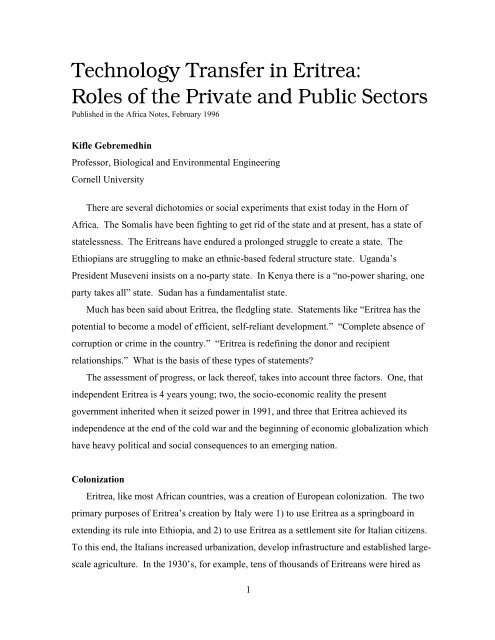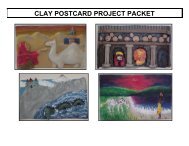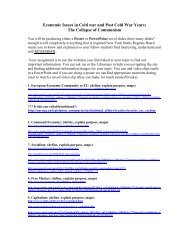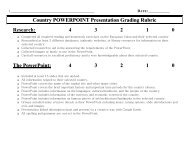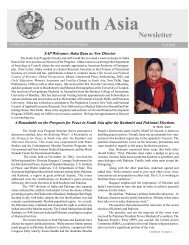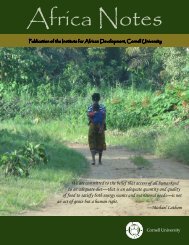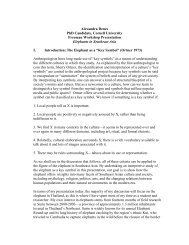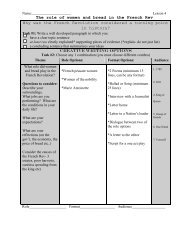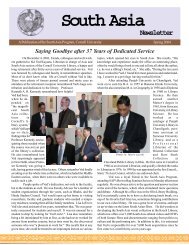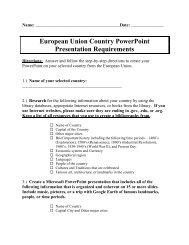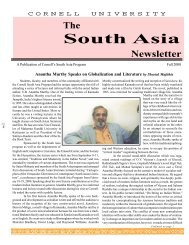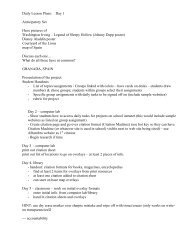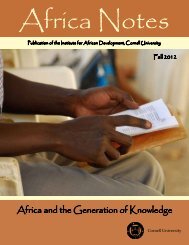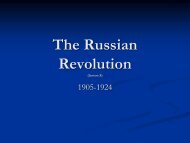Technology Transfer in Eritrea - Institute for African Development
Technology Transfer in Eritrea - Institute for African Development
Technology Transfer in Eritrea - Institute for African Development
Create successful ePaper yourself
Turn your PDF publications into a flip-book with our unique Google optimized e-Paper software.
<strong>Technology</strong> <strong>Transfer</strong> <strong>in</strong> <strong>Eritrea</strong>:<br />
Roles of the Private and Public Sectors<br />
Published <strong>in</strong> the Africa Notes, February 1996<br />
Kifle Gebremedh<strong>in</strong><br />
Professor, Biological and Environmental Eng<strong>in</strong>eer<strong>in</strong>g<br />
Cornell University<br />
There are several dichotomies or social experiments that exist today <strong>in</strong> the Horn of<br />
Africa. The Somalis have been fight<strong>in</strong>g to get rid of the state and at present, has a state of<br />
statelessness. The <strong>Eritrea</strong>ns have endured a prolonged struggle to create a state. The<br />
Ethiopians are struggl<strong>in</strong>g to make an ethnic-based federal structure state. Uganda’s<br />
President Museveni <strong>in</strong>sists on a no-party state. In Kenya there is a “no-power shar<strong>in</strong>g, one<br />
party takes all” state. Sudan has a fundamentalist state.<br />
Much has been said about <strong>Eritrea</strong>, the fledgl<strong>in</strong>g state. Statements like “<strong>Eritrea</strong> has the<br />
potential to become a model of efficient, self-reliant development.” “Complete absence of<br />
corruption or crime <strong>in</strong> the country.” “<strong>Eritrea</strong> is redef<strong>in</strong><strong>in</strong>g the donor and recipient<br />
relationships.” What is the basis of these types of statements<br />
The assessment of progress, or lack thereof, takes <strong>in</strong>to account three factors. One, that<br />
<strong>in</strong>dependent <strong>Eritrea</strong> is 4 years young; two, the socio-economic reality the present<br />
government <strong>in</strong>herited when it seized power <strong>in</strong> 1991, and three that <strong>Eritrea</strong> achieved its<br />
<strong>in</strong>dependence at the end of the cold war and the beg<strong>in</strong>n<strong>in</strong>g of economic globalization which<br />
have heavy political and social consequences to an emerg<strong>in</strong>g nation.<br />
Colonization<br />
<strong>Eritrea</strong>, like most <strong>African</strong> countries, was a creation of European colonization. The two<br />
primary purposes of <strong>Eritrea</strong>’s creation by Italy were 1) to use <strong>Eritrea</strong> as a spr<strong>in</strong>gboard <strong>in</strong><br />
extend<strong>in</strong>g its rule <strong>in</strong>to Ethiopia, and 2) to use <strong>Eritrea</strong> as a settlement site <strong>for</strong> Italian citizens.<br />
To this end, the Italians <strong>in</strong>creased urbanization, develop <strong>in</strong>frastructure and established largescale<br />
agriculture. In the 1930’s, <strong>for</strong> example, tens of thousands of <strong>Eritrea</strong>ns were hired as<br />
1
construction workers to build the <strong>in</strong>frastructure roads and railways <strong>in</strong> preparation <strong>for</strong> the<br />
<strong>in</strong>vasion of Ethiopia. This <strong>in</strong>advertently developed a large <strong>Eritrea</strong>n work<strong>in</strong>g class.<br />
Post-Italian history brought with it a politicization of the <strong>Eritrea</strong>n communities and<br />
planted a sea of deep discord. After the British defeated the Italians <strong>in</strong> 1941, the next ten<br />
years of British Military Adm<strong>in</strong>istration set the framework <strong>for</strong> <strong>Eritrea</strong>’s political system.<br />
<strong>Eritrea</strong>n political parties, trade unions and professional organizations began to emerge.<br />
After Italy’s defeat <strong>in</strong> the Second World War, the victors (Brita<strong>in</strong>, USA, France and the<br />
<strong>for</strong>mer U. S. S. R.) met to decide the fate of <strong>for</strong>mer Italian colonies. While they agreed on<br />
the disposition of Sudan and Libya, they could not agree on the fate of <strong>Eritrea</strong>. The decision<br />
was transferred to the UN and <strong>Eritrea</strong>n politics became caught up <strong>in</strong> <strong>in</strong>ternational and<br />
regional rivalries.<br />
The Federation<br />
Like the 4-power commission, the UN was also unable to decide. The General<br />
Assembly resolved to federate <strong>Eritrea</strong> with Ethiopia <strong>for</strong> 10 years. The history of the<br />
Federation was the history of <strong>Eritrea</strong>’s destruction. Ethiopia began a system abrogation of<br />
the federal arrangement almost immediately. From 1952 onwards, political parties and<br />
trade unions were dissolved and newspapers were suspended. An Ethiopian army was<br />
stationed <strong>in</strong> Asmara and they, along with the police, were used to <strong>in</strong>timidate <strong>Eritrea</strong>n<br />
nationalists. In 1956, the two <strong>Eritrea</strong>n official languages (Tigrigna and Arabic) were<br />
replaced by the Ethiopian language (Amharic) as the official language of <strong>Eritrea</strong>. In 1958,<br />
the <strong>Eritrea</strong>n flag was replaced by the Ethiopian flag. In 1962, <strong>Eritrea</strong> was annexed to<br />
Ethiopia by <strong>for</strong>ce and became a prov<strong>in</strong>ce.<br />
All of these events were greeted by an <strong>in</strong>ternational blanket of silence. This was due<br />
largely because of Ethiopia’s l<strong>in</strong>ks to the west <strong>in</strong> general and the US <strong>in</strong> particular. The US<br />
policy <strong>in</strong> the Horn of Africa was driven by cold war imperatives. There were US<br />
<strong>in</strong>telligence-gather<strong>in</strong>g base <strong>in</strong> Asmara (<strong>Eritrea</strong>’s capital) and military agreements with<br />
Ethiopia. As superpower allegiances shifted, billions of dollars <strong>in</strong> heavy arms flowed to<br />
corrupt autocrats like Ethiopia’s Selassie, Somalia’s Barre and Sudan’s Nimeri. This helped<br />
s<strong>in</strong>k the region <strong>in</strong>to a morass of war, poverty and horrific fam<strong>in</strong>e.<br />
The Struggle <strong>for</strong> Freedom<br />
2
In 1961, <strong>Eritrea</strong>ns launched an armed struggle. Between 1961 and 1977, the US tra<strong>in</strong>ed<br />
the Ethiopian army. From 1977 until 1991, Soviets and Cubans advised and armed the<br />
Ethiopian military junta. Moscow displaced Wash<strong>in</strong>gton <strong>in</strong> Addis Ababa <strong>in</strong> 1977, and the<br />
US, distrustful of the <strong>Eritrea</strong>n movement’s <strong>in</strong>dependent-left politics, shifted to a policy of<br />
soviet conta<strong>in</strong>ment. This <strong>in</strong>volved arm<strong>in</strong>g pro-western states surround<strong>in</strong>g Ethiopia while<br />
ignor<strong>in</strong>g the cont<strong>in</strong>ued fight<strong>in</strong>g <strong>in</strong> <strong>Eritrea</strong>. Former Deputy- Secretary of State <strong>for</strong> <strong>African</strong><br />
Affairs, Chester Crocker, justified this policy as be<strong>in</strong>g the pursuit of “negative strategic<br />
<strong>in</strong>terests.”<br />
The conspiracy of silence cont<strong>in</strong>ued through the fiercest fight<strong>in</strong>g. While most <strong>African</strong><br />
countries had the support of one superpower or another dur<strong>in</strong>g their struggle <strong>for</strong> freedom,<br />
<strong>Eritrea</strong> had noth<strong>in</strong>g. Self-reliance was, there<strong>for</strong>e, not a philosophical or ideological exercise<br />
but a matter of survival. Because of the size of the Ethiopian army and sophistication of its<br />
armaments, every <strong>Eritrea</strong>n had to be mobilized. Women’s constituted one-third of the<br />
<strong>Eritrea</strong>n army and served <strong>in</strong> all ranks. Their participation <strong>in</strong> the struggle was a logical<br />
necessity.<br />
Consequences of War<br />
After <strong>in</strong>dependence, the dreadful effect of the prolonged war was pla<strong>in</strong> to see. <strong>Eritrea</strong><br />
was left with devastated rural and urban economies; the <strong>in</strong>frastructure--villages, towns,<br />
cities, ports and highways were ru<strong>in</strong>ed; <strong>in</strong>dustries were dysfunctional; the education system,<br />
the health services were <strong>in</strong> shambles and the treasury was looted.<br />
On the human dimension, approximately one million people were <strong>in</strong>ternally or<br />
externally displaced; 90% of the 500-600,000 people resid<strong>in</strong>g <strong>in</strong> the Sudan as refugees<br />
needed comprehensive assistance to return; at least 65,000 fighters were killed <strong>in</strong> the war,<br />
and more than 12,000 returned disabled; an estimated 100,000 civilians also died <strong>in</strong> the war.<br />
The government also had the responsibility to support a large army (100,000 strong) and a<br />
large population of orphans.<br />
It is aga<strong>in</strong>st these and many other circumstances then that the challenges of nation<br />
creation and nation build<strong>in</strong>g began simultaneously. The one bless<strong>in</strong>g is that <strong>Eritrea</strong>ns did<br />
not <strong>in</strong>herit a bureaucratic government structure. This fact allowed them to construct a<br />
government of their own design unencumbered by huge <strong>for</strong>eign debts or dubious loyalties.<br />
3
National Unity<br />
Like many <strong>African</strong> countries, the <strong>Eritrea</strong>n people are diverse. There are n<strong>in</strong>e<br />
nationalities or ethnic groups. Indeed, ethnic and religious differences were manifested<br />
dur<strong>in</strong>g the earlier years of the armed struggle and cost the <strong>Eritrea</strong>ns and the struggle dearly.<br />
By the end of the war however, a legacy of unity was created.<br />
Cultural, educational and language policies <strong>in</strong> the post-liberation period were derived, <strong>in</strong><br />
large part, from the EPLF practices dur<strong>in</strong>g the liberation struggle. One of the major goals of<br />
the EPLF leadership was to create a front which brought together different <strong>Eritrea</strong>n<br />
communities and religions through promot<strong>in</strong>g national unity while also recogniz<strong>in</strong>g cultural<br />
diversity. The EPLF stressed secularism and nationalism, and the mix<strong>in</strong>g of fighters from<br />
different nationalities. There was a conscious ef<strong>for</strong>t to shape a leadership that reflected the<br />
different communities. This is still true today.<br />
Post Independence<br />
There are three guid<strong>in</strong>g pr<strong>in</strong>ciples to whatever the <strong>Eritrea</strong>n government does: the unity<br />
of the people, peace, stability; the rule of law; and the economic well-be<strong>in</strong>g of the people.<br />
The immediate task of the government was not only to reconstruct the economy and develop<br />
a political system, but it also had to re<strong>in</strong>tegrate fighters, refugees and the exist<strong>in</strong>g civil<br />
servants. After <strong>in</strong>dependence, the EPLF <strong>for</strong>med a provisional government. A National<br />
Assembly was established (consist<strong>in</strong>g of 50% EPLF members and 50% elected from the<br />
people) and the task of rebuild<strong>in</strong>g began. Priority was given to boost<strong>in</strong>g the rural and urban<br />
economies and rebuild<strong>in</strong>g the physical <strong>in</strong>frastructure. On the political arena, priority was<br />
given to preparation <strong>for</strong> the referendum. The ma<strong>in</strong> burden of the reconstruction fell on<br />
EPLF members who received a small amount of pocket money rather than salaries <strong>in</strong> the<br />
two-year period up to the referendum. Former fighter set to work build<strong>in</strong>g and repair<strong>in</strong>g<br />
roads damaged by tank traffic, technicians restored electricity and water supplies, and were<br />
drafted <strong>in</strong>to factories to repair mach<strong>in</strong>ery and restore production. EPLF cadres moved <strong>in</strong>to<br />
key adm<strong>in</strong>istrative positions.<br />
The Referendum<br />
4
Another promise kept by the EPLF was the promise of democracy based on constitution<br />
and the rule of law. In 1994, with 2 years mandate, a constitutional commission was <strong>for</strong>med<br />
to draft a constitution. The commission consisted of 13 women and 32 men. The<br />
Constitution Commission advocated <strong>for</strong> a prolonged period (2 years) <strong>for</strong> civic education to<br />
foster consensus on the fundamentals prior to the draft<strong>in</strong>g of the constitution. The draft of<br />
the constitution was extensively debated among the population. In the draft<strong>in</strong>g process, a<br />
15-member Advisory Board of Foreign Experts was established, its role to help the<br />
Commission benefit from the experiences of other countries. They were drawn from all<br />
parts of Africa, Europe, the Middle East and the United States. Provision was made <strong>for</strong> the<br />
consultation of m<strong>in</strong>ority and community views through an Advisory Board on Customary<br />
Laws represent<strong>in</strong>g the community elders from the various ethnic groups and the<br />
adm<strong>in</strong>istrative regions <strong>in</strong> the <strong>Eritrea</strong>n society.<br />
The constitution calls <strong>for</strong> the separation of powers among the three branches of government,<br />
free press, freedom of organization, term limits, etc.<br />
Free Press<br />
Currently, all mass communications are controlled by the government. The press<br />
generally presents government news and decisions but provides little political analysis.<br />
Controversial policy decisions do surface tangentially through <strong>in</strong>terviews with m<strong>in</strong>isters and<br />
officials. M<strong>in</strong>isters face frank and vigorous question<strong>in</strong>g <strong>in</strong> public meet<strong>in</strong>gs on many key<br />
issues. A greater degree of openness however, would give greater confidence <strong>in</strong> the<br />
development of pluralism and public accountability. Well-<strong>in</strong><strong>for</strong>med people can play an<br />
active and constructive role <strong>in</strong> the process of build<strong>in</strong>g a susta<strong>in</strong>able state. Free media can<br />
foster free debate <strong>in</strong> sensitive issues. The government seems committed to develop<strong>in</strong>g a<br />
civil society. To date, the only <strong>in</strong>dependent organization is the National Women’s<br />
Association which has a large follow<strong>in</strong>g. Independent community associations, journalist<br />
unions, <strong>in</strong>dependent trade unions, and academic and teacher associations are yet to be<br />
<strong>for</strong>med.<br />
On Democracy<br />
5
The West’s yardstick <strong>for</strong> measur<strong>in</strong>g the existence of democratic governance is elections<br />
and the frequency of elections; the existence of political parties and written constitution; the<br />
free expression of op<strong>in</strong>ions, etc. <strong>Eritrea</strong>n President Esaias Afeworki, on September 8, 1997<br />
at Walton Park Conference, West Sussex, UK, said that “the contemporary debate on<br />
democracy and the democratization processes <strong>in</strong> Africa should be much deeper and wider <strong>in</strong><br />
scope to <strong>in</strong>clude other fundamental dimensions and rights that are <strong>in</strong>dispensable <strong>for</strong> the<br />
dignity and full development of every citizen; the respect of his or her <strong>in</strong>dividual rights; and<br />
<strong>for</strong> their social and economic welfare.” He outl<strong>in</strong>ed several fundamental pr<strong>in</strong>ciples that a<br />
robust and participatory democratic system must <strong>in</strong>corporate. Among them are:<br />
1) The right of every citizen to a fair share of national resources <strong>in</strong>clud<strong>in</strong>g access to basic<br />
necessities and protection from hunger and deprivation;<br />
2) The right to equal opportunity; <strong>in</strong>clud<strong>in</strong>g education and other services that are essential<br />
<strong>for</strong> personal development;<br />
3) The right <strong>for</strong>, and provision of, a responsible, transparent, and non-corrupt government to<br />
uphold the rule of law and defend the national <strong>in</strong>terest.<br />
Demobilization of the army<br />
The <strong>Eritrea</strong>n army numbered 100,000 strong after <strong>in</strong>dependence. Such an amount, <strong>in</strong> a<br />
time of peace, could not be supported by the government. The government demobilized the<br />
army by two-thirds. Because the private sector could not absorb the 60,000 demobilized<br />
fighters, the government had to give them start-up money <strong>for</strong> bus<strong>in</strong>esses or farm<strong>in</strong>g.<br />
National Service Programs<br />
A National Service Program was <strong>in</strong>stituted requir<strong>in</strong>g women and men over 18 to<br />
undergo six months of military tra<strong>in</strong><strong>in</strong>g plus a year work<strong>in</strong>g on reconstruction projects. The<br />
purpose of this was threefold: 1) to compensate <strong>for</strong> <strong>Eritrea</strong>’s lack of capital and to reduce<br />
dependence on <strong>for</strong>eign aid, 2) to cont<strong>in</strong>ue to weld together the ethnically diverse society by<br />
simulat<strong>in</strong>g the liv<strong>in</strong>g and work<strong>in</strong>g arrangements of the war years, and 3) to place women<br />
and men <strong>in</strong> conditions of relative gender equality.<br />
Return of Refugees<br />
6
A major task of the <strong>Eritrea</strong>n government is to manage the return of the 500,000-600,000<br />
refugees liv<strong>in</strong>g <strong>in</strong> the Sudan. Not only repatriation, but rehabilitation and <strong>in</strong>tegration will<br />
also have to be played.<br />
The Challenge of the Economy<br />
The per<strong>for</strong>mance of the economy is crucial to the development of political stability and<br />
harmonious social relations. <strong>Eritrea</strong> is heavily dependent on economic growth as a means of<br />
lift<strong>in</strong>g the majority out of poverty. The Government macro-policy document, the centerpiece<br />
of the development strategy is: “the establishment of an efficient, outward look<strong>in</strong>g, private<br />
sector-led market economy, with the government play<strong>in</strong>g a pro-active role to stimulate<br />
private economic activities.” In the short-term, the new government’s emphasis has been on<br />
recovery and rehabilitation through <strong>in</strong>ject<strong>in</strong>g cash <strong>in</strong>to the economy. In the long term, the<br />
goal is the creation of modern, technologically advanced and <strong>in</strong>ternationally competitive<br />
economy with<strong>in</strong> the next two decades. Among the national development objectives, priority<br />
is given to human resource development, and <strong>for</strong> food security through develop<strong>in</strong>g irrigation<br />
and improv<strong>in</strong>g the productivity of peasants, pastoralists and agropastoralists, exportoriented<br />
<strong>in</strong>dustries and service and truism. This new nation is clearly a work <strong>in</strong> progress.<br />
7


